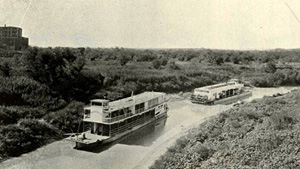From Proud Heritage, Volume II by DCPA. This hardcover book is available online.
Henry Boll, Sr., born 14 November 1830 in the Canton of Aaragu, Switzerland, was one of five children born to Henri Boll and Magdelena Peier (also spelled Perzer in some records). After completing his formal education, he moved to the Zurich area, where he apprenticed in a meat processing plant. Henry married a young lady, Annie Notzli, from the area in 1852 and two children were born from the marriage. Annie and the children died suddenly in 1854 and it was at this time that Henry became interested in the then beginning French colony of LaReunion.
Henry decided to join the colony, and he and Jacob Knopfli (also spelled Knepfli-Knoepfli-Knepfly in various records), a fellow Swiss national, sailed with a group of 25 other colonists from Brenem, Germany in February, 1855, under the leadership of Carl Burkli. They arrived at Galveston after a voyage of 60 days, spent several days in Houston and then traveled by ox-drawn wagons to the colony, arriving on 4 July 1855. The following year Henry and Jacob returned to Galveston, this time by foot, to meet their families who arrived with another group of colonists. The Boll family included Henry’s father and mother, sisters (Dorothea and Susanna) and brother (John). Another brother, Jacob, would follow in later years. He would become a prominent naturalist noted for his work in the development of the mineral resources of Texas, and for his collection of over two hundred species of animals new to science.
Also with new arrivals was the Knopfli family including the youngest daughter Elizabeth, who was to become Henry’s wife in June, 1856. From this marriage were born 10 children (two died in infancy) including Henry Jr., Charles, Jacob, William, Anna, Hennrietta (Mrs. June Peak), Lizzette (Mrs. George V. Peak), and Minnie (Mrs. Ernest Arnoldi). Henry’s sisters also married after their arrival in the colony, Dorothea to Jacob Nussbaumer and Susanna to C. D. Frichot.
As the colony began to fail, Henry and Elizabeth moved to Dallas, acquiring a large tract of land east of the city where they built a fine brick home in 1859. This was at the corner of Swiss and Germania, which name was changed to Liberty during World War I. The house was torn down for the brick in 1860. Henry and his brother-in-law, Jacob Nussbaumer, were both butchers by profession, having served the LaReunion colony in this capacity prior to both moving to Dallas. They established a butchering business until the outbreak of the Civil War. Henry joined the Confederate army in 1862 serving under the command of Colonel Nat M. Burford in the commissary department at Post Waco, where he was the rationing officer responsible for the collection and delivery of provisions and rations in Texas and Louisiana.
Returning to Dallas after the war, he again entered the meat business with Jacob, following this profession for a period of time while developing a highly successful real estate business. He was elected city treasurer in 1869 and served one term. He had become a United States citizen on 25 August 1860.
In 1889, because of failing eyesight, Henry returned to his native Switzerland to consult with a prominent eye specialist, Dr. Theodore L. E. Arnold. A surgical procedure was performed which saved his sight, after which he returned to Dallas. A close friendship developed between Henry and Dr. Arnold and in time, Henry was able to persuade the doctor and his family to move to Dallas. They arrived in 1891 and settled in the area around Swiss and Germania where many other Swiss immigrants to Dallas also lived.
Henry died 5 November 1904 and is buried with his wife, Elizabeth, and other members of the Boll family in Greenwood Cemetery. It was noted in the published report of his funeral that “the funeral procession (route) was changed in order that it could pass over Boll Street which was named in honor of the deceased.” Henry was a most respected and influential citizen of the Dallas community as was attested to by a letter Henry received from the city council and signed by 130 prominent citizens on the occasion of his returning to Switzerland in 1889. He was a Mason and an active member of the A.F.& A.M., Dallas Commandary No. 6 and the Tannehill Lodge No. 52, Dallas Chapter. He was also a member of the Grand Lodge.
By C. F. Norsch, Dallas, TX


